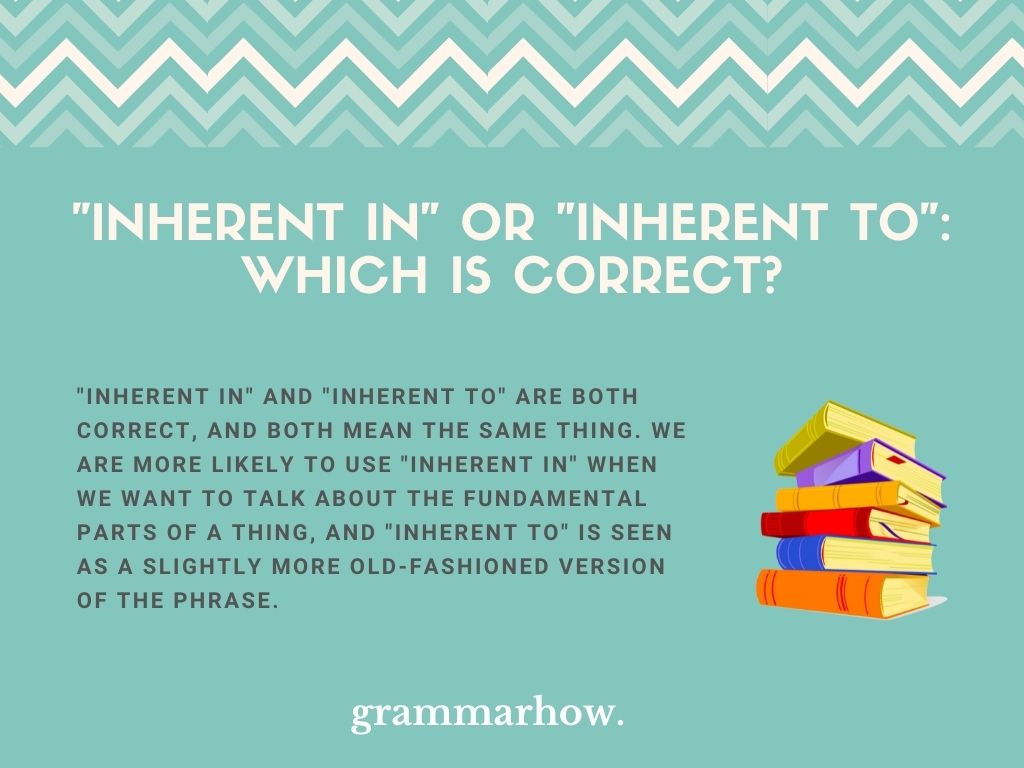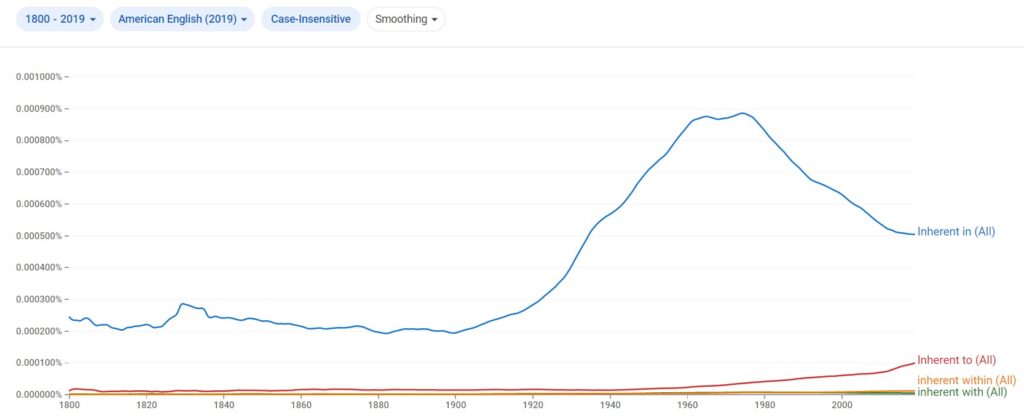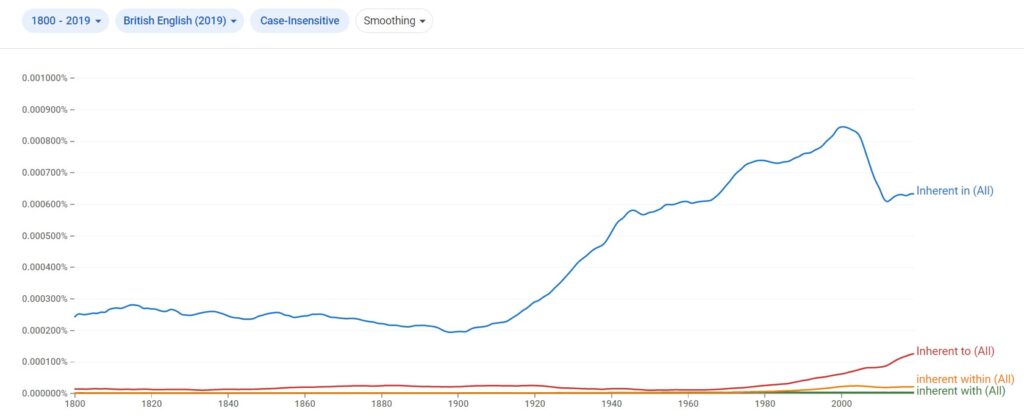Prepositions play an integral role in changing the meanings of certain words or phrases. This article will look at the differences between inherent “in” or “to,” and we’ll show you how you can use both in your writing.
“Inherent In” Or “Inherent To”: Which Is Correct?
“Inherent in” and “inherent to” are both correct, and both mean the same thing. We are more likely to use “inherent in” when we want to talk about the fundamental parts of a thing, and “inherent to” is seen as a slightly more old-fashioned version of the phrase.

The definition of “inherent,” according to The Cambridge Dictionary, is “existing as a natural or basic part of something.”
We can also share some statistics with you to see which of the two prepositions is more common.
According to Google Ngram Viewer, “inherent in” is the more popular phrase, while “inherent to” is barely used in comparison. This shows how likely it is you’ll come across “in” as the preposition in common English.

How Do You Use “Inherent” In A Sentence?
Though we know which of the prepositions are more common, we don’t know much about the word and how to use it in a sentence. We’ll include some examples to help you understand it in just a second.
“Inherent” is used in a sentence when talking about something that is fundamental or exists as a basic part of something else. We can use “inherent” to talk about anything, from life problems to metaphorical issues.
Here are some cases where “inherent” works. Pay attention to the preposition usage as we go through it.
- There are far too many dangers inherent to team sports, so we shouldn’t single any of them out.
- Your societal behaviors are inherent in your genes, and there’s not a lot we can do to change them.
- Making friends in your first year is inherent in college culture; otherwise, we’d all be lost without them.
- Trying to find a good restaurant is inherent in what makes a date worthwhile (or what makes it fail).
- There are many difficulties inherent in traditional farming strategies, which is what makes the job so challenging.
- The shame and judgment that is inherent in society today toward anyone looking to try unconventional jobs is a joke.
- We need to find ways that are inherent to furthering our understanding of the global pandemic.
“Inherent” works well with both “in” and “to.” The two phrases are synonymous when used in this way.
The examples above highlighted how interchangeable “to” and “in” are. However, we mostly showed you “inherent in” since it’s the more popular choice of the two.
Can You Use Other Prepositions With “Inherent”?
“In” and “to” aren’t the only prepositions available to us. We haven’t touched on a couple of others yet, and we thought we’d reserve this section to share those with you.
Within
“Within” is perhaps the next most likely candidate to use (though it’s still not very popular compared with “in” or “to.”)
“Inherent within” is another way of saying “inherent in.” The two phrases are synonymous, which is why we use “inherent in” more often. People prefer to keep their writing short and to the point, and “in” is a much better candidate for doing this than “within.”
Still, these examples will help you to understand its use:
- There are difficulties inherent within society today, making it hard for youths to mesh well.
- The errors inherent within your code tell us all we need to know about your ability.
With
“Inherent with” is another choice alongside “within.” Again, it’s synonymous with “in” and “to,” but we rarely use it. “Inherent with” talks about things that come “with” the natural order of things.
- Plenty of issues are inherent with your work projects, and I think it’s time we moved on.
- The things that I’ve noticed inherent with your misdemeanors tell me everything I need to know about your behavior.
Through
“Inherent through” is an unpopular choice, but it sometimes occurs in common English. “Through” is synonymous with the other options, but many people avoid using “through” in the same way because it feels like the preposition doesn’t offer the same meaning.
- Inherent through the government, it’s impossible for good people to be hired as politicians anymore.
- There are no reasons inherent through this project that I can understand why you’d want to continue.
Unto
Finally, we will touch on “unto.” This one is incredibly uncommon. However, it was perhaps one of the most common choices a few centuries ago.
“Inherent unto” is most closely related to “inherent to.” It’s no longer used today, but it’s still worth talking about. We can use it in the same way, but “unto” is a dead preposition that we very rarely use in any format.
- The intrinsic issues inherent unto this problem showcase everything we need to work on.
- What I’ve noticed here is inherent unto your problems, and I think I can help you with that.
Is The Preferred Choice Of Preposition After “Inherent” Different In US And UK?
Sometimes, there are notable differences between usage in US and UK English. We’ve got some more graphs to show you whether that is the case with “inherent” and its prepositions.
According to Google Ngram Viewer, “inherent in” is still the most popular choice in American English. “Inherent to” is the next most popular, with “within” and “with” trailing at the very bottom of the graph.

According to Google Ngram Viewer, “inherent in” is also the most popular choice in British English. This shows that the two languages use the same prepositions for “inherent.”

Both American English and British English use the same prepositions. “Inherent in” is the most popular choice, and “inherent to” is a less popular but still valid option.
Inherent – Synonyms
Finally, you might be interested in one of these synonyms. It’ll give you an alternative way of using “inherent” while making sure you keep the original meaning.
- In-built
- Intrinsic
- Innate
- Immanent
- Ingrained
- Deep-rooted
- Fundamental
- Essential
- Basic
- Implicit

Martin holds a Master’s degree in Finance and International Business. He has six years of experience in professional communication with clients, executives, and colleagues. Furthermore, he has teaching experience from Aarhus University. Martin has been featured as an expert in communication and teaching on Forbes and Shopify. Read more about Martin here.
